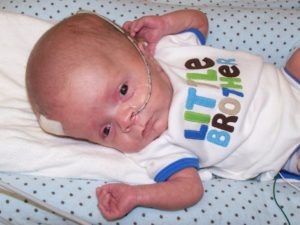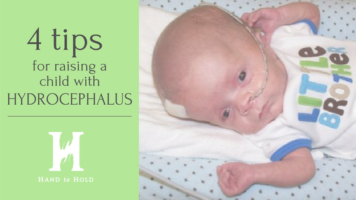 Whether your baby is diagnosed in utero or after birth, the diagnosis of hydrocephalus comes as a shock to any parent.
Whether your baby is diagnosed in utero or after birth, the diagnosis of hydrocephalus comes as a shock to any parent.
A sad fact is that Intraventricular Hemorrhage (IVH) is the leading cause of hydrocephalus in preterm infants and varying levels of IVH are very common in preemies, especially extremely preterm babies. Unfortunately, just as there is very little we can do to stop preterm labour, there is even less we can do to avoid an IVH in a preemie baby. Obstetricians and neonatologists know steps they can take to reduce the risk, but truly what happens next is pretty much beyond their control.
If anything, the diagnosis of hydrocephalus makes us better prepared to handle the unexpected, future wrenches in our plans. If we can get through the scares of hydrocephalus, perhaps it makes us parents more resilient and mentally prepared to fight for our babies and help our children grow into capable, strong individuals.
As a parent finding out your baby has hydrocephalus can feel like a blur – you know that initial blur you felt when you arrived in a NICU? It’s pretty much the same, but this time you are learning yet another new word. You’re being told about a health condition you probably didn’t know existed, and the language coming out of your baby’s doctor’s mouth is more to learn on the fly, looking things up in medical journals and dare I say it? Google.
A parent of a baby newly diagnosed with hydrocephalus can feel isolated. Most friends and family will have never heard of this condition. Everyone will have a lot to learn.
I reached out to a group of individuals living with hydrocephalus at various stages of life. I asked them, if you could share a tip with a parent who has a child with hydrocephalus, what would it be?
Build a support network
One person, a preemie, now aged 50, indicated her family had a lack of support. While more babies are surviving and thriving with hydrocephalus not enough has been done to raise awareness about this lifelong condition or how to support kids growing up with it. So build a support network early on. Help your closest family and friends understand hydrocephalus, share information sheets with them, show them photos, ensure they know the signs and symptoms of hydrocephalus and/or a shunt malfunction, and have them ask you questions. Knowledge is power. The more people looking out for your child’s health and wellness the better.
Treat your child as you treat their siblings or other kids
Yes, your child may have a bit of an unusual situation in comparison to siblings or peers, but don’t forget your child wants to be treated just like every other kid. Sometimes we have to let them try new things and test their limits, even if it scares us as parents. Several years ago, when my twins were young, I met a man in his thirties, who had been born at 27 weeks (same as my babies) and acquired hydrocephalus. He told me it is important to let my child try new things, let him do physical activities (within reason) and be the individual that he wants to become. Don’t put him on the sidelines. It’s hard at first. When you first find out your baby has hydrocephalus, you find yourself willing him to get better, to fight through so you can take him home. You feel like you will need to be extra alert and on the watch for any sign of a shunt malfunction. It is your “job” to keep him alive. You have visions of bubble wrapping his tiny, fragile body, to protect him from bumps and bruises.
One day your child will grow up and will be able to take on life and all that comes with it. Give him or her the opportunities to identify their skills and aptitudes early in life, just as you would for any other child.
Teach your child to understand hydrocephalus
In order to support your child with coming into his own, you will also need to start explaining his condition sooner than later. Does your 4 year old need the cold, hard facts and stats? No. My husband and I started by explaining the condition in simple terms to our son. We have explained to him that when he was born very early, he had a “very big headache” and go on to explain his shunt and reservoir helped “fix” the headache, which the smart doctors did for him. Pretty simple, not too scary, not too many questions asked, and no tears shed.
As our son matures we will introduce more specific language, show him images of his shunt placement and answer more detailed questions. He will need to be prepared to answer questions should we, his parents, not be present, especially if an emergency should arise.
Support others who support your child
Based on over six years of experience with hydrocephalus I can tell you this tip is very important and probably overlooked sometimes. We cannot expect others to support and understand our child’s needs if we have not taken the time to support them in learning about hydrocephalus. For example, the majority of my child’s teachers will not have heard of hydrocephalus before they have him in their class for the year.
We can’t expect our children’s teachers to know the ins and outs of every condition a child may have. I think sometimes an enormous level of expectation is put on teachers. There is no possible way every medical condition can be taught during teacher’s college or professional development days. It is our job to introduce our children, provide a verbal description of their condition, signs and symptoms of a problem, and even provide helpful literature for their teachers to review. I like to have copies of this handout from Hydrocephalus Association to provide to our teachers. This handout about Hydrocephalus and Sport, by Spina Bifida Hydrocephalus Ireland, does a great job describing to parents and teachers how children with hydrocephalus can try many sports, and outlines tips and some precautions for children with hydrocephalus during sports, play, recess and class time.
When you are meeting a teacher for the first time, or perhaps a new coach or babysitter, consider providing them copies of these two documents to help them understand hydrocephalus.
When my son was diagnosed in the neonatal intensive care unit, I felt like all my hopes and dreams had been dashed. I didn’t expect him to play baseball or learn to skate. I had no idea what we were in for, but over time, we discovered he just needed to be given the opportunities to figure out things for himself, just like any other child.
September is Hydrocephalus Awareness Month! Do you have a great tip or inspiring story to share? We’d love to read them in the comments section below!

